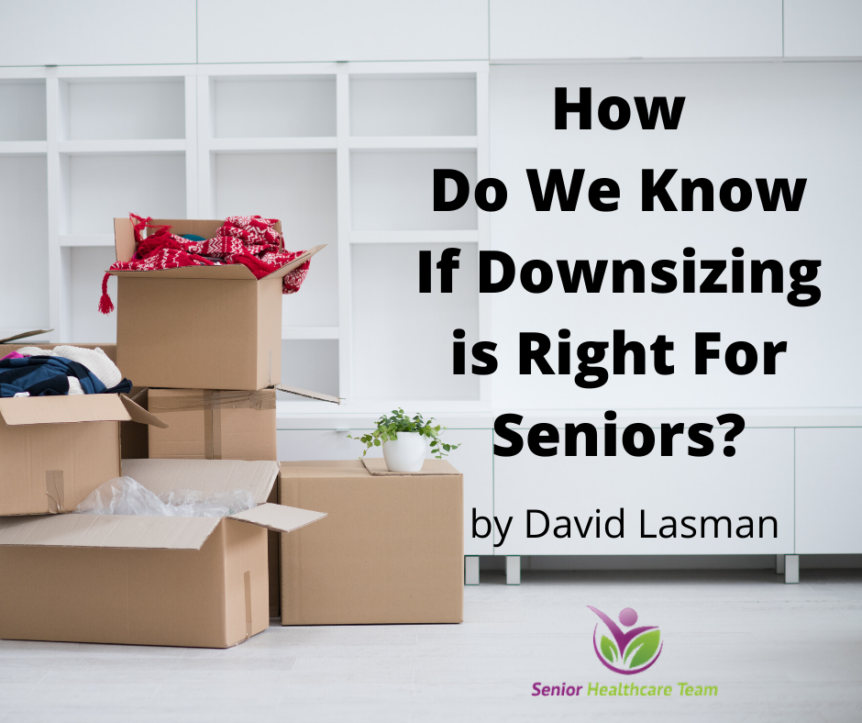Ten years ago, “downsizing” wasn’t even part of your vocabulary. Today, you see and hear the word everywhere. It’s in the mailings you receive from AARP. Journalists are discussing it in your daily online newspaper. Even your friends brought it up when you saw them over dinner last week. And you’re starting to wonder: Should I start thinking about downsizing?
Chances are you dreamed about the day you’d purchase your first home. You may have even been fortunate enough to “upsize” into an even larger home since that first purchase. But now, the more you look around you, the more you’re thinking a smaller abode—whether that’s another house, an apartment, or even a place at a retirement living community—may be more ideal.
However, downsizing isn’t always as simple or painless at it may seem. To help you get a better idea if downsizing is right for you, ask yourself:
1. What Are My Feelings About Downsizing?
Before doing any online research, asking for loved ones’ thoughts and opinions, or creating any pros and cons lists, give an honest answer to this question. For some people, moving from the home they occupy now is simply out of the question. Are you in this group? Or can you see yourself living somewhere new?
2. Am I Using My Extra Space?
When children grow up and move out, parents are often left with multiple empty former bedrooms. For some, this doesn’t mean there’s any less activity in the house. Adult children, grandchildren, or friends frequently stay in those rooms. Or they’ve transformed the rooms into offices or hobby spaces. Others, however, leave rooms rather barren. Ask yourself, which group are you in? If you’re in the latter, do you have plans to use your extra space?
3. How Would Downsizing Affect My Finances?
In a good real-estate market, you’d expect that selling your larger home and purchasing a smaller home would mean you’d soon see a nice cash increase, but that’s not always the case. A study from Boston College’s Center for Retirement Research that looked at older adults who moved in the 1990s and early 2000s found that, while these people generally chose to downsize, they freed up just an average of $26,000. In other words, selling your current home may not result in as much return as you likely expect.
4. Have I Considered All the Costs Associated with Downsizing?
Downsizing can mean a smaller mortgage, less property tax, and less expensive utility bills, but smaller doesn’t always means less expensive. This is especially true if you’re moving to an area with a similar cost of living. According to a 2008 Boston College study, a “large majority” of older Americans who choose to move settle within 20 miles of their previous homes.
Plus, there are other expenses you need to consider when downsizing. For example, if you’ll have to buy new, smaller furniture to fit in your smaller home or if you’ll need to rent storage space for items you don’t want to sell.
5. How Do I Feel About Purging My Possessions?
There’s no way around it: Less space means you’ll need to have less stuff. And while you find cleaning out a closet or two cathartic, just thinking about picking through all of your possessions to decide what stays and what goes is overwhelming. What’s more, some older adults simply don’t want to get rid of their items, especially if they’ve amassed extensive collections. Do you think you can part with your possessions?
When it comes to downsizing, what’s right for some older adults is not for others. That’s why it’s so important you start considering your feelings on downsizing now.
By David Lasman – “Ask Medicare Dave” | President – Senior Healthcare Team
wwww.SeniorHealthcareTeam.com | 866-333-7340
Selecting the right healthcare plan through Medicare can be overwhelming and downright stressful. Senior Healthcare Team is a nationwide resource that provides guidance and support about Medicare to seniors at no cost to them and helps them to choose the most suitable insurance plan tailored to their specific needs and budget. Our goal is to educate and empower our clients to make the best decisions regarding their healthcare and clear up the confusion of Medicare. At Senior Healthcare Team, we aren’t partial to any one insurance company. Our loyalty is to our clients and our mission is to provide them with the best healthcare options at the very lowest cost.

